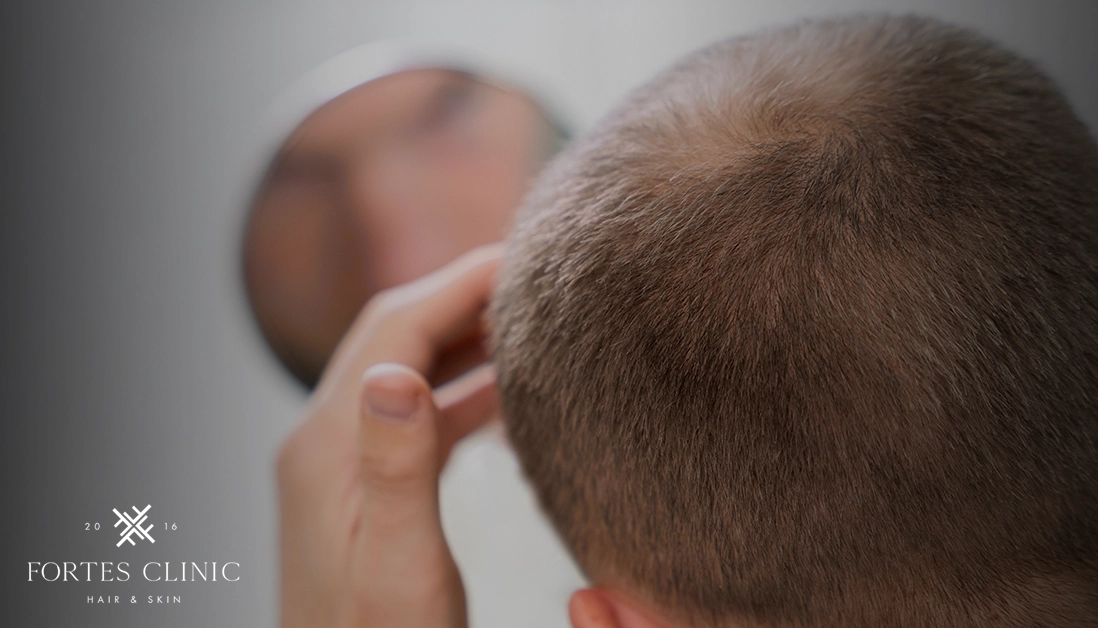Introduction
Hair loss is a common concern for both men and women, and stress remains one of the main contributors. It affects the body’s hormone levels, blood flow, and overall health, all of which influence how the scalp functions. Stress-related hair loss can appear in many forms, from temporary shedding to more persistent thinning, and it may also affect how well a person recovers after a hair transplant. Understanding the link between emotional well-being and scalp health is an important step in achieving lasting results.
Understanding Stress-Related Hair Loss
Hair grows in a continuous cycle of growth, rest, and shedding. When stress disrupts this rhythm, the scalp reacts quickly, leading to increased hair fall or slower regrowth. Stress causes the body to release hormones such as cortisol and adrenaline, which interfere with normal follicle activity. Over time, this hormonal imbalance can weaken the roots, reduce the supply of nutrients to the scalp, and lead to visible thinning.
Common Types of Stress-Related Hair Loss
There are several recognised conditions linked to stress. Telogen Effluvium is the most common, and occurs when more hairs than usual enter the resting phase at once. This results in noticeable shedding a few months after a stressful event. Alopecia Areata involves patchy hair loss that develops when the immune system mistakenly attacks hair follicles, often following severe emotional stress. Trichotillomania is another condition where anxiety leads to repeated pulling or twisting of the hair, causing physical damage to follicles.
Although these conditions differ, stress remains a key factor in each. Fortunately, many cases are temporary and improve when balance is restored in the body.
How Stress and Genetics Interact
While stress alone can cause temporary shedding, it can also make hereditary conditions worse. Men and women with a family history of pattern hair loss may notice that thinning progresses more quickly during times of tension. Once stress levels settle, regrowth can occur, but in some cases, treatment may be required to restore density. Early assessment helps identify whether the cause is environmental, genetic, or a combination of both.
The Connection Between Stress and Hair Transplants
Hair transplant surgery offers an effective, long-term solution for restoring natural density. However, the success of this procedure depends on the health of the scalp and the body’s ability to heal. Stress can influence both.
During recovery, the scalp needs consistent circulation and stable hormone levels to nourish new grafts. When stress levels rise, cortisol may narrow blood vessels and slow the delivery of nutrients. This can lead to inflammation, delayed healing, or a longer regrowth period. Patients under chronic stress sometimes notice that their transplanted hair grows back more slowly than expected.
Emotional Healing After a Hair Transplant
Recovering from a hair transplant requires patience. The initial shedding phase, which happens a few weeks after surgery, can be unsettling even though it is completely normal. Some people worry that the transplanted hair has been lost, but this is simply part of the natural cycle before new growth begins. Managing emotional stress during this stage is important, as tension can affect sleep, recovery, and overall well-being.
Taking time to rest and follow aftercare advice gives the scalp the best chance to heal properly. Many patients find that gentle routines, good nutrition, and relaxation techniques support both their recovery and confidence as results develop.
Managing Stress Before and After a Hair Transplant
Reducing stress is an important part of preparing for surgery. A calm state of mind supports the immune system and helps regulate hormone balance. In the weeks before a procedure, maintaining regular sleep patterns, eating nutrient-rich meals, and staying hydrated can all help prepare the scalp. Light exercise or time outdoors can also improve blood flow and mood, which benefits hair health.
After the procedure, recovery depends on careful aftercare and continued stress management. Patients should avoid unnecessary strain, protect the scalp from friction, and allow enough rest during the healing process. These steps encourage new follicles to settle effectively and improve long-term results.
Learning about Trichology can also be valuable at this stage, as it explains the biological connection between stress and scalp function in more detail.
Recognising the Signs of Stress-Related Hair Loss
Stress-related hair loss can begin subtly. Some people first notice a widening parting line or increased shedding after washing. Others experience diffuse thinning across the scalp or small patches of missing hair. A tingling or sore sensation can also accompany shedding, which may be a sign of inflammation.
If hair continues to fall out for several months, a professional assessment can identify whether it is temporary or linked to another cause. The Men’s Hair Loss and Women’s Hair Loss pages outline the typical patterns of thinning seen in both genders, which can help determine the most appropriate treatment route.

Treatment Options for Stress-Related Hair Loss
Treatment plans are tailored to each patient, depending on the cause and severity of loss.
Non-Surgical Treatment Options
For many, non-surgical options can improve density and scalp condition without the need for surgery. Platelet-rich plasma (PRP) therapy uses the body’s own growth factors to reactivate dormant follicles and strengthen existing ones. Nutritional adjustments, combined with topical treatments, can also help replenish essential vitamins and minerals that support follicle health. Regular scalp care, hydration, and gentle massage improve blood circulation and promote regrowth.
Surgical Treatment for Lasting Results
When stress accelerates genetic thinning, a Hair Transplant may be recommended. Healthy follicles are carefully relocated to thinning areas, restoring density that looks and feels natural. Results develop gradually, but when combined with stress reduction and lifestyle balance, the improvement can be long-lasting.

Supporting Long-Term Hair and Scalp Health
Hair restoration success depends on ongoing care. Maintaining a balanced diet, staying hydrated, and managing emotional well-being are all essential for long-term scalp health. Stress management techniques such as meditation, stretching, or time in nature help maintain hormonal balance and prevent future shedding.
It is also important to protect the scalp from harsh weather, heat, and chemical exposure. Regular check-ups allow a clinician or trichologist to monitor progress and ensure the scalp remains healthy. Patients who continue healthy habits after treatment often find their results remain stable and natural for many years.
When to Arrange a Consultation
Anyone who notices significant shedding or changes in scalp density should seek advice from a qualified professional. Early diagnosis can confirm whether stress is the main cause or if another factor is contributing. Addressing the issue promptly makes treatment more effective and helps preserve existing hair.
A thorough consultation may include scalp analysis, hormone testing, and lifestyle review. From this, a personalised plan can be created that combines stress management, trichological care, and, where needed, advanced restoration techniques.
Summary
Stress-related hair loss affects many people, but it does not have to be permanent. By understanding the connection between emotional well-being, scalp health, and treatment recovery, it becomes possible to protect and strengthen the hair. Managing stress before and after a transplant can make a measurable difference to results, supporting faster recovery and natural regrowth. With the right guidance and consistent care, lasting improvement is achievable.



